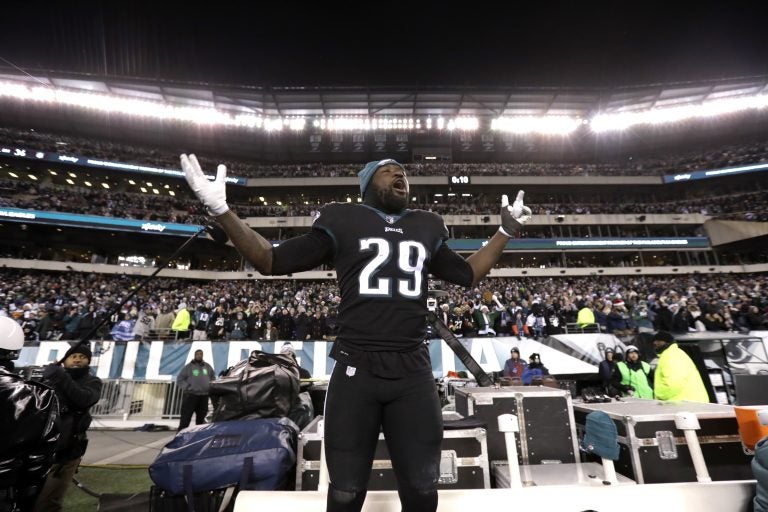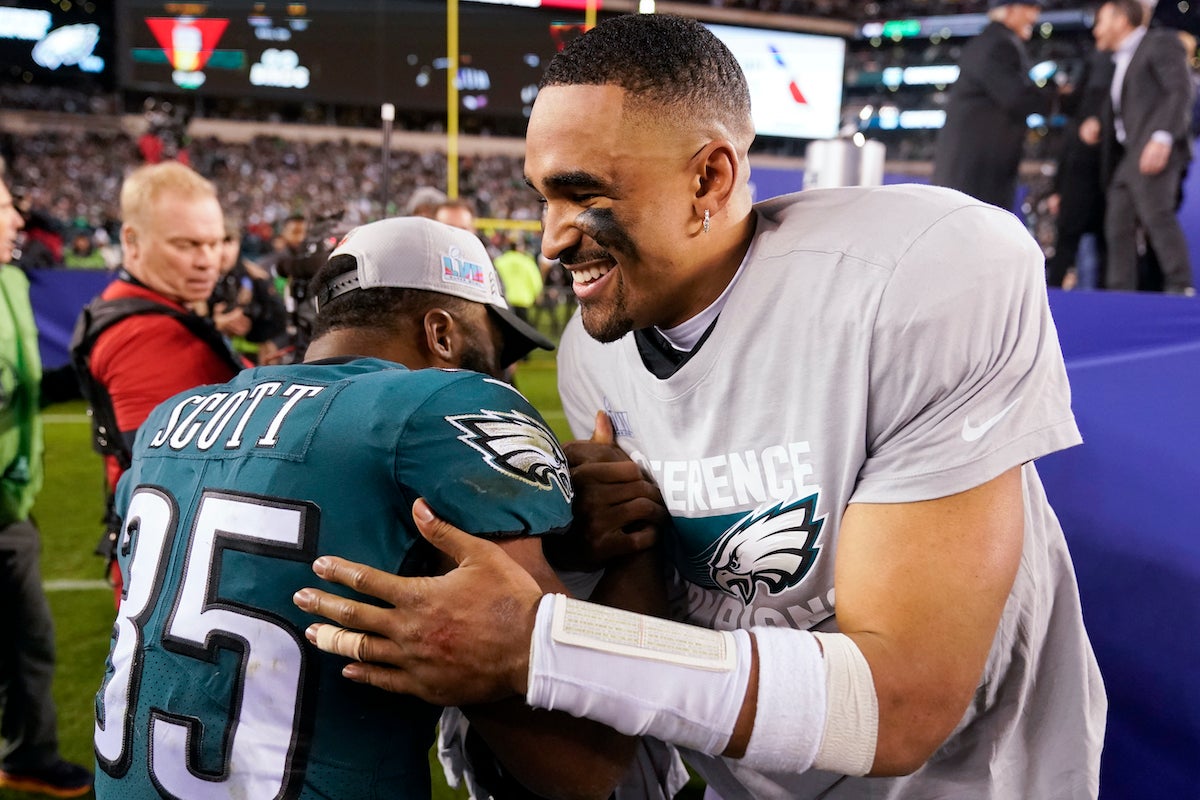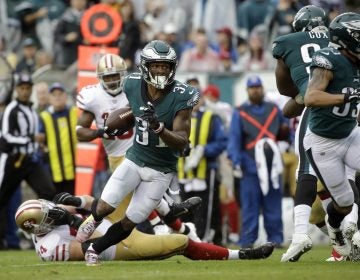Philly businesses hope to see green during Eagles’ playoff run
In January, the Eagles will return to the playoffs for the first time in four years. But will postseason play boost local business?
Listen 2:10
Philadelphia Eagles' LeGarrette Blount cheers during the second half of an NFL football game against the Oakland Raiders, Monday, Dec. 25, 2017, in Philadelphia. (AP Photo/Michael Perez)
Phan Cave isn’t so much a game-day caterer as it is a full-service tailgating experience. You pick the location, and they’ll bring the goods: a trailer, three flat-screen televisions, food, drink, and even a couple of bathrooms.
Business peaks during Eagles season, said Colleen O’Hara, who co-founded the company a little over three years ago.
“We do really well when they’re good and really well when they’re not so good,” O’Hara said. “Tailgating is the side of Philadelphia no one ever gives up on.”
But when the Eagles win enough to make the playoffs, Phan Cave wins, too. Normally after the regular season ends, O’Hara and her co-founder take a breather. This year, though, for the first time since they founded the company, the Birds will play in the postseason.
“It just gives us that extra month, a nice little boost during the winter time when we wouldn’t be booking many events,” said O’Hara.
The Eagles last hosted a playoff game in January of 2014.
This year, thanks to their win Monday over Oakland, the Birds will have the top seed in the NFC playoffs. That means they’re guaranteed a home game the weekend of Jan. 13. If they win that game, they’ll host the NFC championship on Jan. 21.
That’s likely good news for folks who run sports bars, catering businesses, or, say, personalized tailgating companies.
But just how good is it for the local economy overall?
In 2014, officials estimated one Eagles playoff game would attract 2,500 visitors and pump $10 million into the local economy.
“Our local restaurants will feel it. Even folks like our Uber and taxi drivers will feel it,” said Larry Needle, executive director of PHL Sports, a division of the Philadelphia Convention and Visitors Bureau. “It has some impact across the board.”
NFL playoff games are especially helpful, said Needle, because they’re played in the typically tightfisted weeks after Christmas.
Economic benefits often negligible
A home playoff game does not, however, deliver the kind of financial jolt sporting events like the Army-Navy game and the NFL Draft deliver, Needle said. The NFL Draft drew tens of thousands of visitors to the city. Each dollar those visitors spent was a dollar they typically would’ve spent in some other city’s regional economy.
Home playoff games, by their design, are the opposite.
A few thousand visitors may parachute in for the game depending on the location and popularity of the opponent, but most of the seats will go to local fans. And even if local fans spend money by patronizing a bar or ordering takeout, that money isn’t necessarily new money for the regional economy. For the most part, it’s money those local fans would’ve been spent on something else, like a few games at the bowling alley or a restaurant reservation.
“I don’t think any economist would say going into the playoffs is a bad thing,” said Victor Matheson, a sports economist from the College of the Holy Cross. “I think most of us would say it’s close to zero.”
The good news for Philly is that hosting a playoff game costs little. Unlike the NFL Draft — which required closing roads and building a small village of semi-permanent structures — nearly all revenue generated during the Eagles playoff run will be a net gain. It’s just that those revenues don’t figure to be sky high.
There are some other potential benefits to Philadelphia’s participation in the postseason. Television exposure could help promote the city to fans around the country, and the city’s citizenry could get a psychic boost from watching its team win.
It’d be tough to quantify those advantages, though — if indeed they do exist.
Matheson said at least one study tried to measure whether cities prosper when their sports teams perform well. Conducted 15 years ago, the survey found little correlation between postseason success and a city’s economic health.
There was, however, one exception.
When a team won the Super Bowl, its home city did experience per capita-income increases larger than projected.
Researchers don’t know why. It could be a statistical fluke. It could be because happy people — wrapped in the warm glow of Super Bowl splendor — spend more or work harder.
“It’s at least plausible that happy people make for better workers,” said Matheson.
If that kind of money-generating euphoria does exist, Philadelphia has never experienced it. The Eagles have never won the Super Bowl, and would need three playoff wins this year to break that ignominious streak.
This year’s title game is in Minneapolis, and Colleen O’Hara has already started scouting parking lots near the stadium in case a client demands her services for the ultimate game.
“[If] they want us there, we’ll figure a way to get there,” she said.
If Super Bowl week does become a business boon for O’Hara, it will be money happily spent for plenty of long-suffering Philadelphia fans.
WHYY is your source for fact-based, in-depth journalism and information. As a nonprofit organization, we rely on financial support from readers like you. Please give today.





